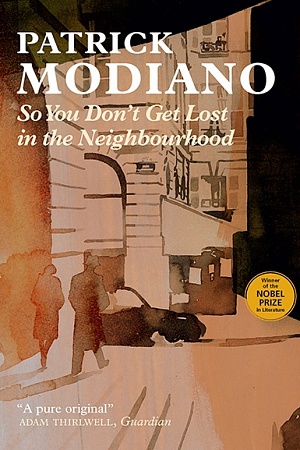AFTER THE CIRCUS
Yale University Press (Footprint) $28.95 pb, 197 pp, 9780300215892
AFTER THE CIRCUS by Patrick Modiano
In early 1960s Paris, an eighteen-year-old who is keeping up his student enrolment to delay compulsory military service is questioned by the police because his name has been found in an address book. At the same time, a slightly older young woman is also being interrogated. The boy contrives to meet her afterwards in a café. Thus begins a story which is part romance, part identity quest, part crime intrigue. It is narrated from a perspective of thirty years after the events, which adds to the tale a psychological tension between an always flawed memory and the need to find clarity.
As a stand-alone text, After the Circus is a little masterpiece in the French minimalist and ironic noir tradition, reminiscent of Godard's Breathless (1960) or Truffaut's Shoot the Piano Player (1960). Having planted Chester Himes in a café at the beginning of the novel to conjure the mood of the Paris jazz age, the author proceeds to elaborate a narrative that is anything but hard-boiled, all suggestion and inference, including its erotic dimension: a narrator who bears the now-forgotten former name of a far-flung metro station (Obligado); a half-abandoned luxury apartment in central Paris overlooking the Seine; a girl in a raincoat, black skirt, and sweater; a small band of suspicious characters; a black Labrador named Raymond; two locked heavy suitcases, a big car, and empty city streets; the fear and expectation, sustained throughout, that something bad is bound to happen. The cover photo chosen by Yale University Press of a pair of sleek female legs emerging from a car is perhaps too overtly posed to match Modiano's subtlety, although the fragmentary composition and the play of light and shadow are convergent with elements of the novel's tone.
Continue reading for only $10 per month. Subscribe and gain full access to Australian Book Review. Already a subscriber? Sign in. If you need assistance, feel free to contact us.










Leave a comment
If you are an ABR subscriber, you will need to sign in to post a comment.
If you have forgotten your sign in details, or if you receive an error message when trying to submit your comment, please email your comment (and the name of the article to which it relates) to ABR Comments. We will review your comment and, subject to approval, we will post it under your name.
Please note that all comments must be approved by ABR and comply with our Terms & Conditions.